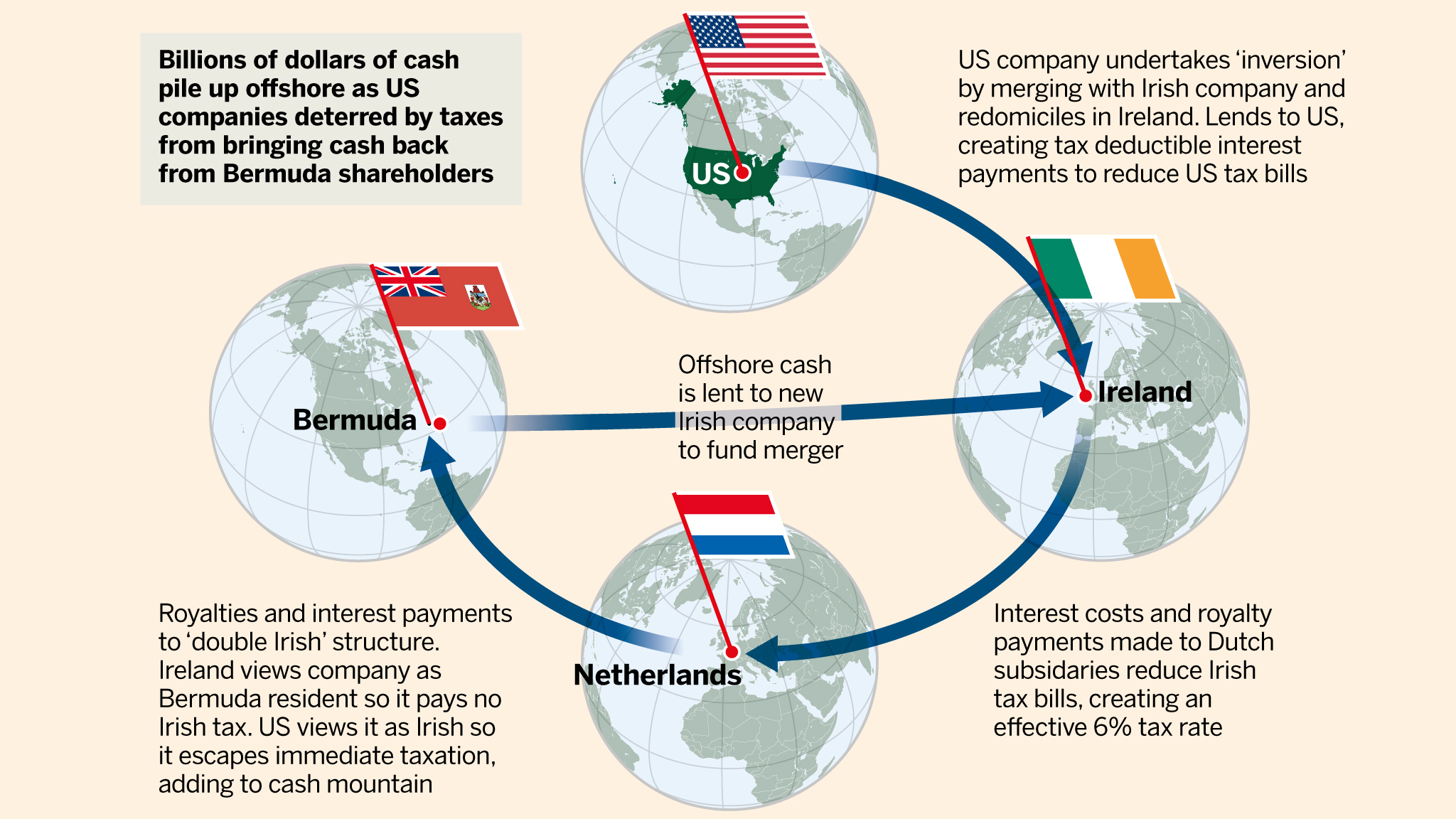Last August, I shared a list of companies that “re-domiciled” in other nations so they could escape America’s punitive “worldwide” tax system.

And in May, I pontificated about Pfizer’s effort to re-domicile in the United Kingdom.
Well, to paraphrase what Ronald Reagan said to Jimmy Carter in the 1980 presidential debate, here we go again.
Here’s the opening few sentences from a report in the Wall Street Journal.
Medtronic Inc.’s agreement on Sunday to buy rival medical-device maker Covidien COV PLC for $42.9 billion is the latest in a wave of recent moves designed—at least in part—to sidestep U.S. corporate taxes. Covidien’s U.S. headquarters are in Mansfield, Mass., where many of its executives are based. But officially it is domiciled in Ireland, which is known for having a relatively low tax rate: The main corporate rate in Ireland is 12.5%. In the U.S., home to Medtronic, the 35% tax rate is among the world’s highest. Such so-called “tax inversion” deals have become increasingly popular, especially among health-care companies, many of which have ample cash abroad that would be taxed should they bring it back to the U.S.
It’s not just Medtronic. Here are some passages from a story by Tax Analysts.
Teva Pharmaceuticals Inc. agreed to buy U.S. pharmaceutical company Labrys Biologics Inc. Teva, an Israeli-headquartered company, had an effective tax rate of 4 percent in 2013. In yet another pharma deal, Swiss company Roche has agreed to acquire U.S. company Genia Technologies Inc. Corporations are also taking other steps to shift valuable assets and businesses out of the U.S. On Tuesday the U.K. company Vodafone announced plans to move its center for product innovation and development from Silicon Valley to the U.K. The move likely means that revenue from intangibles developed in the future by the research and development center would be taxable primarily in the U.K., and not the U.S.
Recommended
So how should we interpret these moves?
From a logical and ethical perspective, we should applaud companies for protecting shareholders, workers and consumers. If a government is imposing destructive tax laws (and the United States arguably has the world’s worst corporate tax system), then firms have a moral obligation to minimize the damage.
Writing in the Wall Street Journal, an accounting professor from MIT has some wise words on the issue.
Even worse, legislators have responded with proposals that seek to prevent companies from escaping the U.S. tax system. The U.S. corporate statutory tax rate is one of the highest in the world at 35%. In addition, the U.S. has a world-wide tax system under which profits earned abroad face U.S. taxation when brought back to America. The other G-7 countries, however, all have some form of a territorial tax system that imposes little or no tax on repatriated earnings. To compete with foreign-based companies that have lower tax burdens, U.S. corporations have developed do-it-yourself territorial tax strategies. …Some firms have taken the next logical step to stay competitive with foreign-based companies: reincorporating as foreign companies through cross-border mergers.
Unsurprisingly, some politicians are responding with punitive policies. Instead of fixing the flaws in the internal revenue code, they want various forms of financial protectionism in order the stop companies from inversions.
Professor Hanlon is unimpressed.
Threatening corporations with stricter rules and retroactive tax punishments will not attract business and investment to the U.S. The responses by the federal government and U.S. corporations are creating what in managerial accounting we call a death spiral. The government is trying to generate revenue through high corporate taxes, but corporations cannot compete when they have such high tax costs. …The real solution is a tax system that attracts businesses to our shores, and keeps them here. …The U.K. may be a good example: In 2010, after realizing that too many companies were leaving for the greener tax pastures of Ireland, the government’s economic and finance ministry wrote in a report that it wanted to “send out the signal loud and clear, Britain is open for business.” The country made substantive tax-policy changes such as reducing the corporate tax rate and implementing a territorial tax system. Congress and President Obama should make tax reform a priority.
Here’s some info, by the way, about the United Kingdom’s smart moves on corporate taxation.
For more information on territorial taxation, here’s a video I narrated for the Center for Freedom and Prosperity.
And here’s my futile effort to educate the New York Times on the issue.
And if you want some info on the importance of lower corporate taxation, here’s another CF&P video.
P.S. Last February, I shared a hilarious video spoof about some action figures called the “Kronies.” These fake toys symbolize the sleazy insiders that have made DC a racket for well-connected insiders.
Well, the Kronies are back with a new video about the Export Import Bank, which exists to subsidize companies that give lots of contributions to politicians.
I’ve written before about the Export-Import Bank being a perfect (in a bad way) example of corruption in Washington, but if you want to know the details about this crony institution, Veronique de Rugy of the Mercatus Center is a walking encyclopedia on the topic.
By the way, the recently defeated House Majority Leader has been a big supporter of Ex-Im Bank subsidies, and it’s very revealing that Boeing’s share price fell after his defeat. Investors obviously think those handouts are very valuable, and they’re worried that the gravy train may come to an end with Cantor on his way out the door.
Addendum: Some readers have already asked whether it would have been better to say that America’s corporate tax is “sadistic” rather than “masochistic.”
From the perspective of companies (and their shareholders, workers, and consumers), the answer is yes.
But I chose “masochistic” because politicians presumably want to extract the maximum amount of revenue from companies, yet that’s not happening because they’ve set the rate so high and made the system so unfriendly. In other words, they’re hurting themselves. I guess they hate the Laffer Curve even more than they like having more money with which to buy votes.

























Join the conversation as a VIP Member